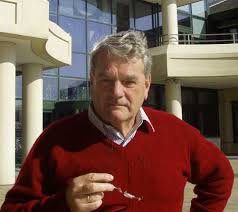Last Monday was David Irving’s birthday. He celebrated it from his sickbed to which he has been confined for over year, in failing health. But this year marks another anniversary which, though he will not, we celebrate happily.
It is 25 years since Professor Deborah Lipstadt’s victory over Irving in a historic libel action. He said she had defamed him by calling him a holocaust denier. The court decided otherwise. It was a terminal moment in his revisionist career. To commemorate the occasion we are reprinting here David Edgar‘s splendid survey of Irving’s rise and fall, which appears in the current, and final, print edition of Searchlight.
Irving’s Wars: The rise and fall of a Britische Historiker
On a cold November morning in 1963, a writer answered the door of his north London flat to find two engineers from the General Post Office who had come to upgrade the wiring of the writer’s phone. Immediately suspicious (the wiring had been renewed earlier that year) the writer called the police, who arrived and arrested the two men.
The fake engineers were then arrested, charged with gaining entry by artifice, and subsequently fined £20 each. As anti-fascist activist Gerry Gable was later to admit, the operation to search David Irving’s flat for incriminating documents had not gone entirely to plan. But, then, nor did David Irving’s own plan to rehabilitate the Nazis, deny the holocaust and create a new far right movement with himself at its head.


What had alerted Gerry to Irving’s activities was the latter’s 1963 book about the allied bombing of Dresden in the dying days of the second world war, which was clearly intended not just to describe a much-criticised military action, but to exaggerate its death toll and to put the allies in the worst possible light. By 1977, Irving had also published The Destruction of Convoy PQ-17, blaming escort group commander Jack Broome for the catastrophic losses of the wartime convoy (for which claim Broome sued Irving for libel and won £40,000) and the notorious Hitler’s War, which claimed that Hitler had neither ordered nor knew about the holocaust.
Fascism lite
In that year Searchlight published the first of a series of exposes of Irving’s assertions, activities and ambitions. It revealed how, while attending lectures at Imperial College in the late 1950s, Irving had wheedled his way into editorship of a student newspaper, publishing articles defending apartheid and defining Britain’s World War Two struggle against Nazism as “a fight against the first great unifying force Europe had known for 600 years”. Quizzed on these views by the Daily Mail, Irving was happy to be called a “mild fascist”, describing Hitler’s mountain-top retreat Berchtesgaden as a “shrine”.
In the same Searchlight, Irving was revealed to have based his assertion that Hitler didn’t order the holocaust on one note of one conversation with Himmler concerning one transport. He suppressed the mountains of contrary evidence, including Goebbels’s 1942 insistence that “it is a war to the death between the Aryan race and the Jewish bacillus. … Here too the Fuehrer is the inflexible champion of a radical solution”. The first German edition of Hitler’s War claimed that The Diary of Anne Frank was a fake, an allegation which had to be removed in later versions.
Addressing fascist meetings
In March 1982, Searchlight ran a cover feature on Irving’s subsequent activities, including extensive speaking tours of Germany organized by far-right and holocaust-denying organisations like the German People’s Union (DVU), by whom Irving was referred to as the “Britische Historiker”. During which he challenged the legality of the Nuremberg trial of Nazi leaders.
But by now Irving aspired to be more than just a propagandist. In 1980 he had founded the Focus Policy Group, in order to “bring together the more intelligent right-wing people in this country” in a movement that would avoid the mistakes of far-right movements of the past, including Oswald Mosley’s. To promote this idea, he had addressed meetings of noted British fascists, from the National Front, Column 88 and the League of St George.
At the same time, inspired by the then prominent American New Right, Irving bought up mailing lists from far-right organisations from the Monday Club, and some NF branches to the holocaust-denying Historical Review Press. An extra 1,500 copies of Searchlight’s March 1982 edition were printed and distributed, and the feature led – among other things – to council-backed demonstrations against an Irving visit to Oxford.
Admitting that “the National Front is one of the organisations with which we do have links at a low level”, Irving clearly saw the Focus Policy Group as an aspirant bridging organisation to bring together the warring factions of the far-right, under his own banner. Over subsequent months and years Searchlight was to report on Irving’s domestic and foreign activities.
A friend indeed?
In America, he was to assure the revisionist Institute for Historical Review– at whose 1983 conference in Los Angeles he was the main guest speaker – that “the Jews had no greater friend in the Third Reich than Adolf Hitler”. In Germany, he continued extensive tours to what he admitted were “extreme right-wing audiences”. While back home he published a journal, Focal Point, in which he promoted “benevolent repatriation”, a policy which did not preclude “the introduction of a compulsory repatriation programme”.
Having de-authenticated and then re-authenticated the fake Hitler Diaries, Irving set out in search of diaries of Hitler’s mistress Eva Braun. Searchlight’s spoof version of the short-lived Mrs Hitler’s diaries adorned the front page of our August 1983 edition.
By the mid-1980s Irving had clearly not emerged as a unifying force for the far right, Focal Point had ceased regular publication, and Irving had embarked on a journey to full-fat holocaust denial. By 1986 he was arguing that the holocaust was not Hitler’s policy but the work of “nameless criminals” acting on “their own impulse”. Preparing to give evidence in the trial of Ernst Zundel (publisher of the notorious, holocaust denying pamphlet Did Six Million Really Die?, written by National Front deputy chairman Richard Verrall) Irving was persuaded that the holocaust was fictitious and, indeed that Verrall’s pamphlet was “over 90%” factually accurate.
‘No mass murder at Auschwitz’
In June 1989 Irving made the “epochal announcement” that there had been no mass murder at Auschwitz, and in 1991 he republished Hitler’s War without any mention of the holocaust: “If something didn’t happen, then you don’t even dignify it with a footnote”. In August 1992, in the wake of the Sunday Times entering into an £83,000 deal with Irving over its publication of Goebbels’s diaries, Searchlight revealed that the Historiker had addressed a revisionist seminar in London (alongside American holocaust-deniers) attended by John Tyndall and other leading members of the BNP).
But then in 1996 Irving made the epochal mistake of suing American academic Deborah Lipstadt for calling him a holocaust denier in her 1993 book Denying the Holocaust: The Growing Assault on Truth and Memory. Covered in detail by Searchlight, the 2000 trial proved a disaster for Irving, who used his closing statement to attack the magazine for “a stream of defamatory articles”. Nonetheless, Mr Justice Gray found that Irving was antisemitic and racist, “a right-wing Nazi polemicist” and “an active holocaust denier”, who had “deliberately skewed the evidence to bring it in line with his political beliefs”.
Irving bankrupted
The ruling in Lipstadt’s favour bankrupted Irving. In an attempt to raise funds, Irving embarked on a speaking tour of the United States, partly sponsored by the openly neo-Nazi National Alliance.
In 2005, Irving was arrested and tried in Austria for holocaust denial and was sentenced to three years, of which he served 13 months. In 2010, he planned to take groups of enthusiasts, paying £1,500 each, round the sites of Nazi death camps including Treblinka and Auschwitz (described by Irving as no more than a “tourist attraction”). Officials announced they would refuse Irving entry on the grounds that his presence would be “unacceptable and offensive to the memory of the victims.”
Gerry Gable has made my life a holocaust for the last 35 years
David Irving
Searchlight gave assistance to the Lipstadt defence team, and furnished evidence which helped anti-fascist lawyers in Canada and Australia prevent Irving from spreading his poison in those countries. The Lipstadt trial and the Austrian conviction destroyed Irving’s claims to be a serious historian, but Searchlight’s exposure of his ambitions, activities and lies over the preceding years and decades had laid the groundwork for his exposure and disgrace.
As Irving himself was to put it, “Gerry Gable has made my life a holocaust for the last 35 years”.








